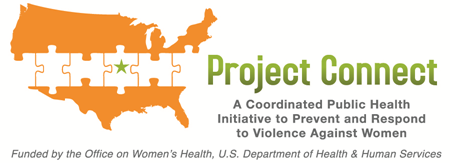
A project of the U.S. Department of Health and Human Services Office on Women's Health


Click the red escape button above to immediately leave this site if your abuser may see you reading it.

Team leaders:
Frances E. Ashe-Goins, R.N., M.P.H.
Aleisha Langhorne, M.P.H., M.H.S.A.
The Office on Women's Health (OWH) of the U.S. Department of Health and Human Services (HHS) works to stop violence against women and girls in our country and around the world. It does this through both programs and policy work.
OWH coordinates partnerships within the department and with other federal, state, and local agencies. We do this in part through our coordination of the HHS Steering Committee on Violence Against Women and our staffing of the presidentially-appointed National Advisory Committee on Violence Against Women.
We also serve as the point of contact for HHS on violence against women issues. In that role we direct citizens, colleagues, and organizations to the appropriate office or agency to respond to inquiries and provide resources.
Through the work of our Regional Women's Health Offices, we have had an impact on domestic violence, sexual assault, and violence against girls throughout the country. The Regional Women's Health Coordinators have done groundbreaking work on the issues faced by women in prison, tribal women, and women in the U.S. territories. Learn more about regional activities on violence against women.
In past years, some of our work has focused on how violence affects women with disabilities, men as partners in prevention of violence, and enhancing college and university curriculums to include domestic violence and sexual assault issues.
Vice President Joe Biden's commitment to ending violence against women has been unwavering. The Violence Against Women Act (VAWA) that he authored has reshaped the way the United States responds to domestic violence and sexual assault by enhancing law enforcement practices, improving the criminal justice system, and creating a network of services for victims.
Even though there has been a tremendous amount of progress made, young women between the ages of 16-24 still experience high rates of sexual assault, stalking, and relationship violence. One in five women will be sexually assaulted while in college, and one in four women will be a victim of domestic violence in her lifetime. Vice President Biden recognizes that in order to change these statistics, it is imperative to involve men and boys in the effort to cease violence against women. Most males are not violent towards women, and we need to create opportunities for this silent majority to speak out.
In response to the Vice President's call to action and youth initiative, the Department of Health and Human Services, the Department of Education, and the Department of Housing and Urban Development are collaborating to hold ten regional town hall events throughout the country during the last week of October 2011 on the topic of Engaging Men in Ending Violence Against Women.
Team leader: Aleisha Langhorne, M.P.H., M.H.S.A., Health Scientist
Under this project, organizations develop and implement programs to address the connection between domestic violence and an increased risk of HIV/AIDS. The project primarily targets female survivors and victims of domestic violence. It trains domestic violence counselors to incorporate HIV/AIDS risk reduction strategies into their service delivery. The organizations providing services under this project title are:
Team Leader: Aleisha Langhorne, M.P.H., M.H.S.A.
This project has become a core component of OWH's Health and Wellness Initiative for Women Attending Minority Institutions.
The mission of the program is to develop and implement programs and policy to address violence against women (VAW) on college/university campuses across the United States
Objectives:
Under this project, organizations will develop and implement programs to address VAW on college/university campuses. The project targets female and male students of all ages and will train faculty, staff, and campus security/police concerning critical issues associated with VAW. This project is designed to ensure programs adequately and specifically address the needs of college/university women. There is also a parallel project component around men's support of women's health.

The Office on Women’s Health (OWH), in partnership with Futures Without Violence, has selected five health sites serving Native communities and six states to continue a public health initiative designed to improve the health and safety of women and children. Project Connect: A Coordinated Public Health Initiative to Prevent Violence Against Women is supported by OWH and funded through the Violence Against Women Reauthorization Act of 2005.
The selected grantees who will begin work in January 2013 include:
Project Connect is a national initiative to change how adolescent health, reproductive health, and Native health services respond to sexual and domestic violence. Research demonstrates that programs like Project Connect can help improve maternal and adolescent health and decrease the risks for unplanned pregnancy, poor pregnancy outcomes, and further abuse.
"Project Connect is one of the only programs providing a national, coordinated public health model to improve the health response to domestic and sexual violence,” said Nancy C. Lee, M.D., deputy assistant secretary for Health-Women’s Health. “We’re proud to continue our collaboration with Futures Without Violence on this groundbreaking and transformative initiative.”
OWH and Futures Without Violence will provide technical assistance and monitor the grantees selected for Project Connect. The 11 grantees were selected through a competitive process and will be awarded funds for implementation over a period of three years.
Project Connect grantees are committed to providing innovative, effective, and culturally relevant services to traditionally underserved communities, including LGBTQ youth, rural women living in poverty, and Latinas. The University of Pittsburgh School of Medicine is implementing an evaluation plan to measure the effectiveness of both the clinical intervention and policy change efforts.
Over the past three years, Project Connect has trained nearly 6,000 health care providers in specific interventions to assess for and respond to domestic and sexual violence in their clinical settings. The initiative has helped establish partnerships between public health programs and domestic and sexual violence advocates to effectively identify and refer victims of abuse. Project Connect teams have also had a significant impact on state-level policies, including instituting assessment of domestic and sexual violence into statewide protocols, improving data collection by adding new questions about domestic violence to statewide surveillance systems, increasing funding statewide for clinics that address violence, and requiring annual training on violence in key state programs.
In 2009, the U.S. Department of Health and Human Services (HHS) Office on Women's Health (OWH) launched the Women of Faith Advocacy Initiative to explore how faith-based organizations (FBOs) can better serve victims and survivors of domestic violence and sexual assault. Each participating organization is taking a unique approach to helping churches foster and practice greater advocacy for individuals affected by violence against women.
Content last updated July 16, 2012.
Resources last updated February 01, 2013.